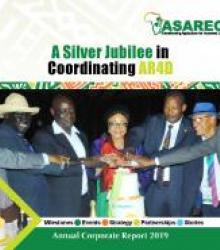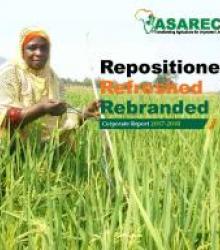| Title | Author | Asbract |
|---|---|---|
| Enhancing biodiversity conservation and poverty reduction through sustainable management of plant genetic resources | ASARECA | Following the adoption of the Global Plan of Action (GPA) and the State of the World’s Plant Genetic Resources Report, several informal consultations catalyzed by IPGRI , FAO and the Nordic Gene Bank (NordGen now)were held particularly during the FAO Commission meetings. These efforts culminated to the preparatory meeting held in Kampala, Uganda from 3-5 November 1997 to establish Eastern Africa Plant Genetic Resources Network (EAPGREN) funded by Swedish International Development Cooperation Agency (Sida). After a gestation period of 5 years developing the project and tracking funding, the network was established in May 2003 and operationalized at regional level in 2004. EAPGREN is a regional joint project of National Agricultural Research Systems (NARS) of the ASARECA member countries viz. Burundi, Eritrea, Ethiopia, Kenya, Madagascar, Rwanda, Sudan and Uganda. Within these countries, there are national focal persons for the network which undertake the activities at national level and represent the national program in the regional EAPGREN processes.
|
| Drylands development, pastoralism and biodiversity conservation in Eastern Africa | Aboud Abdillahi, Philip Kisoyan, Jan de Leeuw, Mohammed Said, An Notenbaert, Jane Gitau, Pablo Manzano, Roba Guyo, Shadrack Omondi, Michael Waithaka, Miriam Kyotalimye | Measuring multiple values of dryland systems provides a means for valuing, comparing and making policy decision based on various benefits of ecosystem services, and can be a powerful tool to support wise use and management of dryland environment. |
| Integrated management options for sustainable lowland rice-legume cropping systems in Madagascar and Tanzania | G.J. Ley, Razakamiaramanana, A.J. Tenge, and Nivo Grazia Ravoavison | This project explored possibilities of increasing productivity of rice systems in the region through various management options focusing on integration with legumes. |
| Water harvesting and irrigation for improved crop and livestock production | Kabirizi, J.; Wannyama, J.; Njarui, D.; Itabari, J.; Mugerwa, S.; Nakiganda, A.; Kaganda. S.; Nizigama. J. | Smallholders crop-livestock farming in Eastern and Central Africa is characterized by low productivity due to low and erratic rainfall.Water development for agricultre is a priority, but poorly designed and planned irrigation undermines efforts to improve livelihoods and exposes people and environment to risks. The objective of the study was to introduce and evaluate socially desirable gender-appropriate water harvesting and irrigation strategies to reduce poverty through effective development and management of water harvesting and irrigation in ECA region. |
| Consumer perceptions and valuation of quality and safety of value added dairy products in ECA | Lusato R. Kurwijila, Stella Makokha and Amos Omore | Objective: To assess the consumer demand for quality and safety of dairy products in the ECA region. |
| Drylands Development, Pastoralism and Biodiversity Conservation in Eastern Africa | ASARECA | The regional policy note shows how investment in drylands has to take into account the potential for complimentary uses that can increase the income of local inhabitants of drylands beyond the revenues of a single undertaking. Activities that allow for other compatible uses are also the ones that provide a higher value in terms of biodiveristy conservation and long term sustainability. |
| Payment for wildlife conservation in the Maasai Mara Ecosystem | ASARECA | The case study on the Mara ecosystem shows how biodiversity can be incorporated into Payment for Ecosystem Services (PES) schemes that favour local communities. Conservancy models replicated around Maasai Mara National Reserve provide direct income or social services to local pastoralists. |
| Wildlife and livestock need each other for prosperity | ASARECA | The case study on Tarangire Ecosystem, Tanzania, points to the positive feedback between pastoralism and biodiversity conservation and how land use changes and investment options can either drive to sustainable income for local population or to poverty, lack of options and immigration. |
| Information on managing Plant, Human, Animal and Environmental health | ASARECA | A source of practical information on managing Plant, Human, Animal and Environmental health |
| Gender responsive participatory variety selection protocol | Ann Ritah Nanyonjo, Robert Sezi Kawuki, Williams Esuma, Kyaligonza Vincent, Hale Tufan | Gender responsive participatory variety selection protocol: Understanding men and women preferences in the Zombo highland cassava breeding trials |
| Policy Statement on Financing ASARECA’s Regional AR4D Programmes | ASARECA | ASARECA Member Countries Re-Affirm Commitment to Finance Regional Collaboration in Agricultural Research for Development |
| Environmental Management Framework | ASARECA | This is the final version of the Environmental Management Framework for the Association for Strengthening Agricultural Research in Eastern and Central Africa (ASARECA). It has to be observed by all ASARECA Programmes and/or activities implemented by the Association and/or its partners. |
| Gender Mainstreaming for Food Security: Good Practices, Outcomes and Recommendations from SIMLESA Project | Adeline R. Muheebwa, Yeshi Chiche | Gender issues in agricultural research occasion dynamic sets of opportunities and constraints that influence research effectiveness. The project Sustainable Intensification of Maize-Legume cropping systems for food security in Eastern and Southern Africa (SIMLESA) was implemented in Ethiopia, Kenya, Malawi, Mozambique and Tanzania to increase farm-level food security and productivity, in the context of climate risk and change. ASARECA led the gender mainstreaming activities in SIMLESA by conducting capacity building and |
| Proceedings of SIMLESA Poilcy Forum 27-28 October 2015 | Waithaka Michael et al | PROCEEDINGS OF SIMLESA POLICY FORUM 27-28 October 2015 Laico Lake Victoria Hotel Entebbe, Uganda. |
| Best Bet Research Outputs | ASARECA | Kimenye L, Bombom A. 2009. A booklet with 40 abstracts of best-bet research outputs generated by former ASARECA research networks (NPPS) and their NARS partners in the East and Central African region. They represent a collection of well tried and tested technologies and approaches that have potential for up scaling to improve livelihoods. The abstracts, which have been grouped into 9 thematic clusters, give brief accounts of the key outputs generated and lessons learnt. |
Search
Search entail eLibrary collection
Copyright © 2025. All rights reserved.
Designed By ASARECA


